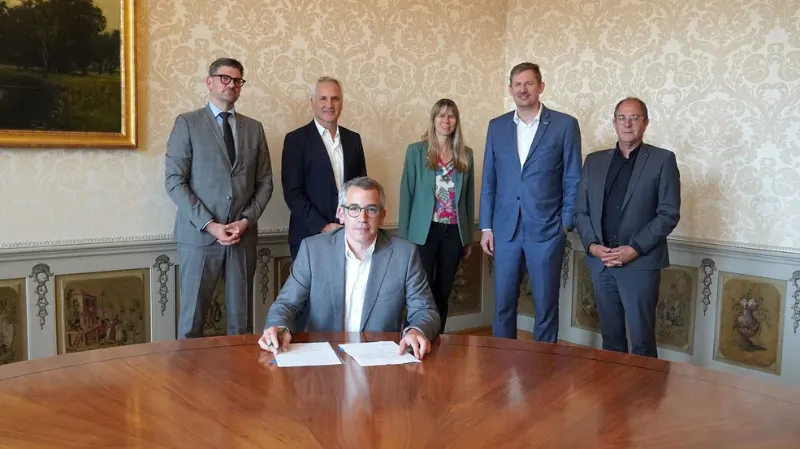New association combines medical practice and research
Developments in medical research and innovation benefit from close collaboration between doctors on the one hand and researchers on the other. However, due to increasing time and cost pressures in everyday clinical practice, it is difficult for medical professionals to actively participate in research projects. As a result, their everyday clinical experience is missing in the academic world. Conversely, without the involvement of medical professionals, the incorporation of new scientific findings into practice is delayed.
Three hospitals in the canton of Aargau and three institutions in the ETH Domain are now working together to tackle this problem. On 3 June 2024, Kantonsspital Aarau AG, Kantonsspital Baden AG, Hirslanden Klinik Aarau AG, ETH Zurich, Empa and the Paul Scherrer Institute PSI jointly founded the "Association for Medical Research and Innovation in the Canton of Aargau".
In future, doctors who mainly work clinically at Aargau hospitals will be able to apply for research time via this association. As part of this research time, they will then work on joint projects with researchers from ETH Zurich, Empa or the Paul Scherrer Institute. They get extra-occupational research time for 6 to 24 months.
The association compensates the research time made possible by the hospitals with financial contributions. For the first five years, the association receives one-off start-up funding totalling CHF 1 million from the participating institutions and hospitals (50 %) and from the Canton of Aargau (50 %). The association thus plans to approve five to eight applications for research time each year. In the long term, the association is to be supported exclusively by third-party funding, for example from foundations or donations.
Pooling diverse experience
"The strengths of the ETH Domain range from basic research to the development of new technologies," says Christian Rüegg, Director of the Paul Scherrer Institute. "It is always important for us to come into contact with practice at an early stage. In the medical field, we need the concrete experience of medical specialists so that a new development can prove itself."
Rüegg refers to the already existing, very successful collaborations between the Aargau hospitals and the ETH Domain, including proton therapy and radiopharmacy at PSI and the research collaboration "Clinical - Research ETH@KSB" between ETH Zurich and Baden Cantonal Hospital. There are also already several projects at Aarau Cantonal Hospital that are being carried out jointly with ETH Zurich, for example in the field of robotics in connection with strokes. Empa is also active in the field of health and medtech and is developing medical implants and innovative diagnostic and therapeutic approaches together with various companies.
According to the institutions involved, the collaborations to date have shown that there is a need for a deeper and broader exchange. One of the main aims of the new partnership is to transfer newly developed technologies and concepts from the laboratories of the participating research institutions into clinical practice more quickly and efficiently – so-called translational medicine.
"The newly founded association will enrich and accelerate new research and developments in medicine," says Jürg Hans Beer confidently. The physician heads a research group at the University of Zurich and is also clinically active at Baden Cantonal Hospital. In the newly founded association, Beer now heads the evaluation committee, which reviews and assesses the projects submitted. "The tendering process is competitive and we judge according to clearly defined quality criteria," explains Beer.
While clinics receive compensation for losses from the association, the budget for the research projects themselves must be secured from other sources. Applicants must provide proof of funding for their projects when submitting their application.
Win-win for the research institutions, hospitals and the canton
The ETH Domain sees the association as a building block for realising the goal it has set itself in the Strategic Plan 2025–2028, namely to contribute to solutions to the major challenges of our time with its research, particularly in the field of people and health. Specifically, the exchange promoted by the association will help to identify challenges in clinical practice, incorporate practical knowledge into new developments at an early stage and test new results and innovations in everyday clinical practice. The participating hospitals increase their attractiveness as employers through the offer and gain better access to research results and medical innovation through the programme. The Canton of Aargau is investing in its own innovative strength through the association and is continuing to position itself as one of the most innovative cantons in Switzerland.
